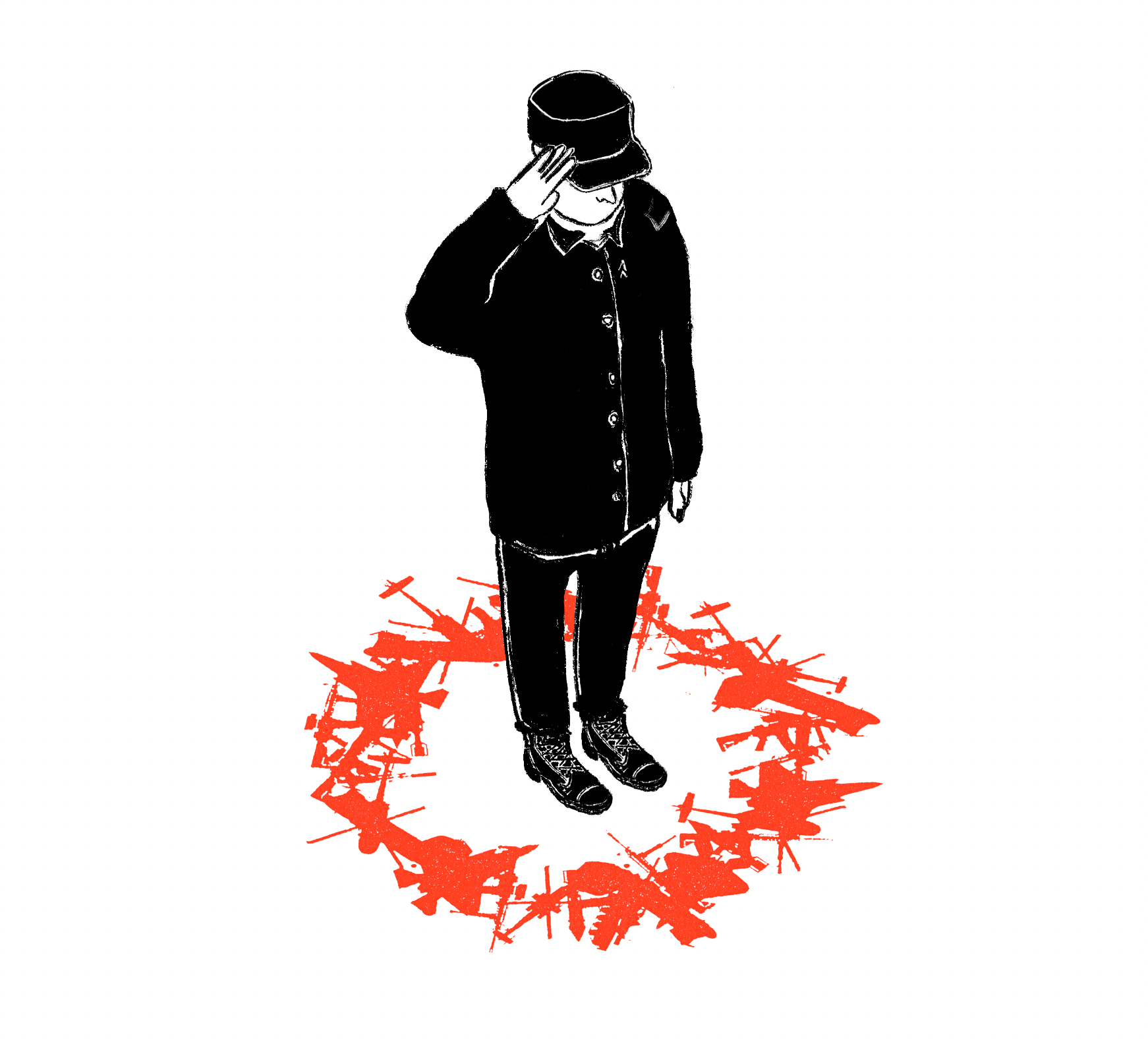About Face – The Veterans Fighting Militarism & Imperialism
By Sofia Gallo. Illustration: Rory Robertson-Shaw.
German soldiers being offered free public transport when travelling in uniform; recruiters in the US getting bonuses for each new soldier who passes training; the UK promising an additional £75 billion in "defence" spending over the next six years - it's clear that imperial states are gearing up. As the devastating effects of climate breakdown limit our access to basic necessities, like crops and water, imperial powers will use more and more brutal military intervention to acquire these resources, both competing with other powerful countries and further robbing those that can't defend themselves. Domestically, as borders are increasingly militarised and the repression of dissent becomes a priority by our governments, it will not be unusual to see our own armies deployed against us. Stopping militarism and busting the myths around the military is crucial, so I interviewed two comrades, Blade and Acil, from About Face - a veteran’s group directly challenging the US military.
"About face" is the order given in the military to turn around. This is where the group takes its name and their aim: to turn their backs on the military-industrial complex and imperialism. Born twenty years ago, and formerly known as Iraq Veterans Against the War, About Face consists of former soldiers who joined the US military post 9/11 and enlisted under the pretext of a "global war on terrorism". Their work ranges from educational campaigns on the shady workings of the military-industrial complex and the lobbying power that weapon manufacturers hold over politicians, to community organising and direct action against key infrastructure aimed at dismantling the war machine.
Deeply aware of the military's manipulative tactics that enlisted them in the first place, About Face members tail military recruiters who have uninhibited access to high schools in the USA in a tactic called counter-recruiting. In particular, US military recruiters target low-income classes (an identity often overlapping with racial minorities in the country) whose instability leaves them with limited and usually dire job or studying opportunities. Blade described recruiters as 'salesmen' who can lie to teenagers about the rosy future the army can give them. Like all skilful and manipulative salesmen, they are trained to personalise their pitch to each kid. If you want to be a musician, they will tell you about how the reggae artist Shaggy was in the army; if you want to be an engineer, they will tell you that after a few years of military service, you will get hired in the private sector, and so on.
Recruiters have quotas of people they need to enlist. George W. Bush's 2001 No Child Left Behind Act granted the military easy access to schools. Often framed as an educational reform bill, it provides funding only to schools that allow unrestricted access and students' information to military recruiters.
Recruiters are also skilled in selling the 'altruistic' part of the military. Blade explains this through a reference to David Graeber's Bullshit Jobs, identifying the army as a haven for 'frustrated altruists' - people who want to help but don't know how. Before the Iraq War, for example, hundreds of people were told that if they enlisted, they would serve in the National Guard and help people during environmental disasters. Once in, they were deployed in Iraq.
About Face counter-recruiters go into the same schools to tell students what the recruiters leave out: veterans experience disproportionately higher rates of suicide, homelessness and drug addiction, not to mention the near impossibility of finding employment if you leave before the end of your contract and get stamped with a 'dishonourable discharge'.
I asked Acil what she says to young people who are thinking of enlisting: "First of all, I ask why they want to join, and I look for alternatives. If they want to enlist to get tuition funding, I help them find a scholarship, or any other way not to sell their body to the military so they can study later".
She also tells them about the dangerously high rates of sexual assault in the military, the bureaucratic loopholes, and the gag orders that silence survivors and let perpetrators go unpunished. During the Iraq war, for example, female soldiers were more likely to be sexually assaulted by those within their own ranks than to die in combat.
Another typical lie recruiters tell students is that the military will allow them to travel and see the world. About Face veterans know that soldiers are not backpackers and that 'seeing the world' really means being stationed abroad to pursue US' imperialist interests. I asked Acil and Blade how they developed their anti-imperialist views after deployment in Afghanistan and Iraq.
Blade remembers his 19-year-old self joining the army as one of those 'frustrated altruists'. After the Charlie Hebdo attacks in Paris, Blade realised he had assisted with 'counterinsurgency' (military operations conducted against guerrillas or revolutionaries) for years without knowing what that meant. He started reading about the US involvement in destabilising the Middle East for its economic interests.
Acil's anti-imperialist sentiments developed by reading the history of different empires. While still stationed in Afghanistan in a former Russian base, she learnt about British and Russian military campaigns in that region and began to connect the dots. All empires share a history, and the US was doing the same thing that had been done in the region over and over again.
About Face also establishes contact with people currently in the military, encouraging them not to deploy, emphasising that the chance of dying is high, the chance of killing innocent people even higher, and that if they get hurt, the promises of free medical care will not be fulfilled. Veterans give suggestions on how to undermine orders, or on creative ways to get out of the military. They do this through informal in-person conversations, social media, and GI coffeehouses (a tactic learned from Vietnam veterans). Establishing these coffeehouses near military bases creates space for soldiers to meet and interact with anti-war literature and veterans.
The re-use of old tactics developed by veterans of a different war honours a history of anti-imperialist struggle in the belly of the beast. The military is a powerful bureaucracy that resists change, but as a successful enterprise, it also knows when and what to change to stay in business. I dread to think what this will look like with military technology getting better and better, and as its deployment against domestic uprisings becomes more common. But, as Blade put it, "whatever they change, we will be here to counter it."
What they learnt over the years can help people in different countries, so if you or anyone you know is contemplating joining the UK military, you can reach out to aboutfaceveterans.org
Sofia Gallo is an anarchist currently based in Italy with a background in survivor support and Palestine solidarity. She has been in the West Bank twice with the International Solidarity Movement (ISM).
Your £3/month subscription is used to print 30 copies per issue, worth £90 for our vendors. We went from 1000 copies per issue in 2018 to roughly 35,000 per issue in 2024. The only thing stopping us doing more is money. With your support we can go even further. Help us print and distribute more copies for free to anyone who wants to sell it by becoming a monthly subscriber.


